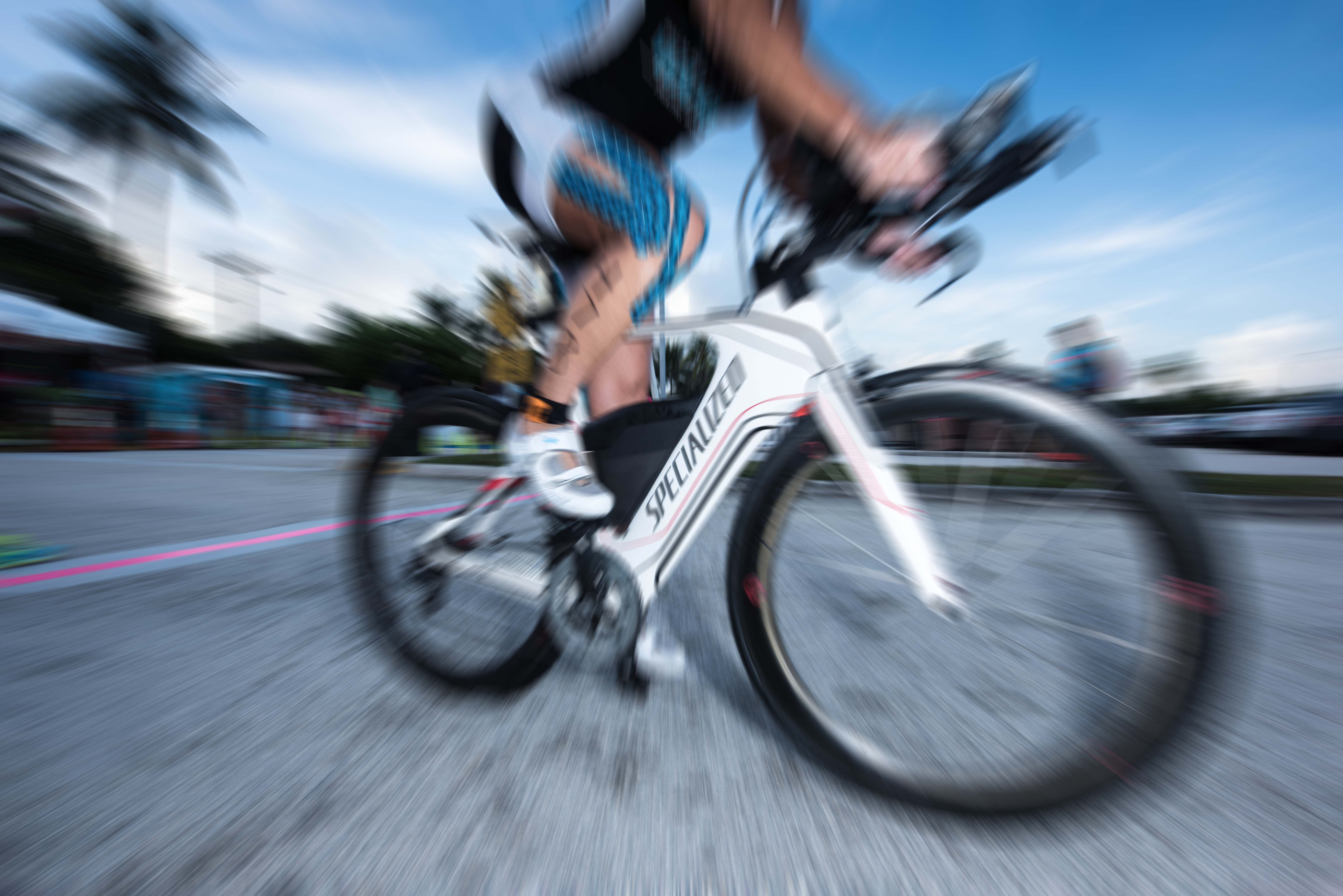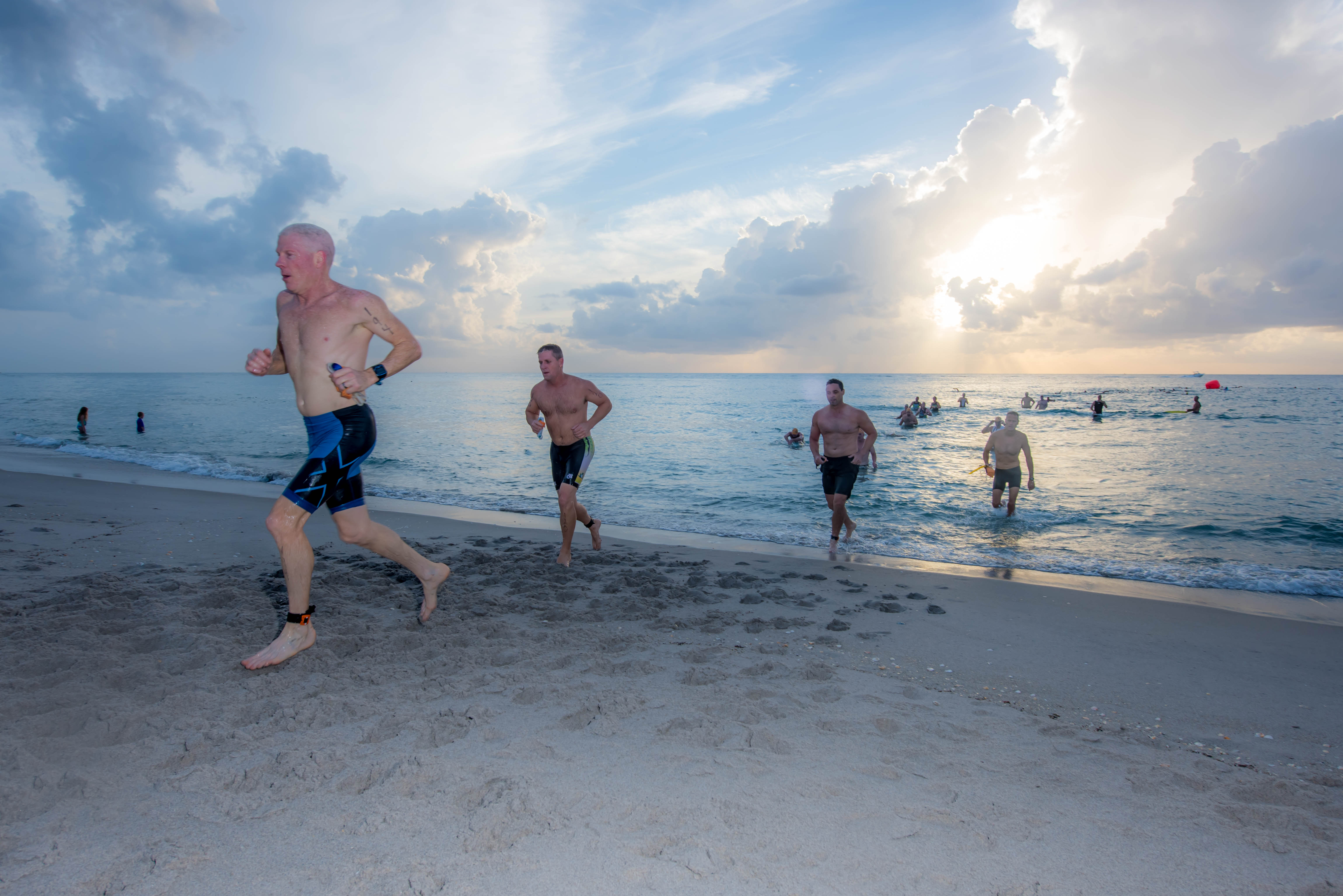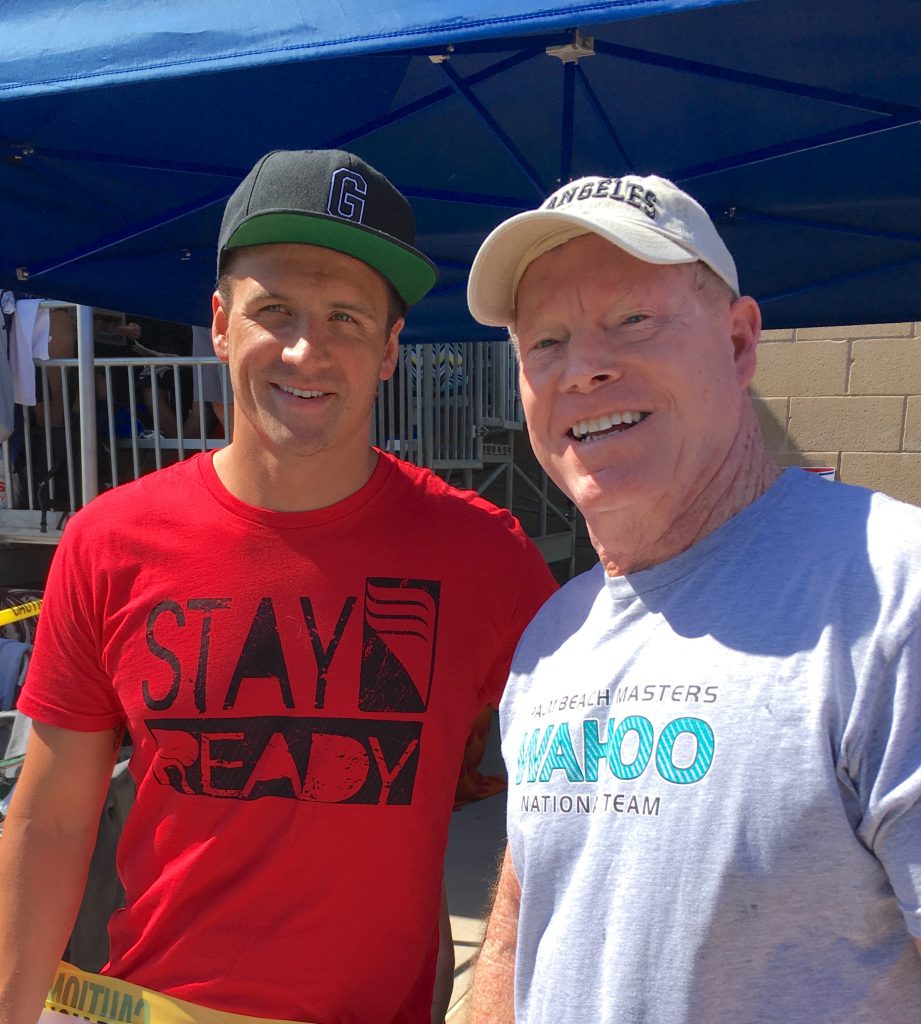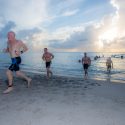I quietly set my swim bag down on an empty chair, and surveyed the pool deck.
A clique of elite swimmers stood at the edge of the pool, throwing their arms up and down while stretching gorilla- like shoulders.
I was last to take off my shirt and jeans. My once triathlete’s physique was now an embarrassment to me. Love handles spilled over the top of my swimsuit.
My back, shoulders and limbs bore the scars of a hundred of skin cancer removals.
Worse, my mental state was not what it once was. Moments like this made me anxious.
What lane would I pick? What swimmers wouldn’t hassle me for being too slow?
The last of my pre-swim rituals was coating my nose with white zinc oxide. It was just one more uncool thing that came with age—a sun damaged face. I hauled my sixty- year old frame to a “middle ability lane”. Roger, a fast competitive swimmer nodded that I could join his group. It included swimmers who trained hard and swam in monthly meets and the annual U.S. Masters Championship.
Into the chilly water they went. I followed, like the caboose of a train. We stroked our way forward in a circular pattern, up the right side lane, back the right side. The elite swimmers “flipped” their turns. I did open turns –grabbing an extra breath of much needed oxygen at each side of the pool. We swam drills such as kicking and pulling with only one arm. My lungs burned and so I took the easy way out and put on flippers.
Often, I reached for a pair of paddles to keep up. If another swimmer mentioned my use of cheating with the paddles and flippers, I remarked about my hip replacement surgery last year. The truth however, was that I was in one of life’s deep ruts. My Dad passed away and I was selling his house. My children were grown and had their own lives. My wife, an amazingly upbeat and caring spouse, was patient with my mid-life crisis, but I was mired in a fog of anxiety and depression.
Nearing the end of the hour and fifteen minutes of swimming we covered 3,000 yards. Miraculously, at some point during the workout, my mind calmed , and all imagined problems melted away.
During the next days which included short sprints, I started coming to life a bit. I remembered the joy of swimming to win ribbons in elementary school, and how great it felt to feel fit and to fall asleep like a rock at the end of the day.
Some muscle memory returned, and at times, I felt a rush of energy and the desire to explode across the surface, spraying water like an egg beater. It wasn’t pretty, but for very short distances , I could keep pace with some of fastest swimmers on the team.
“You’ve been sand bagging Bob,” teased Grant the coach. He was not complementing my speed. He was commenting on my laziness. If you ranked humans by the effort they expended, I had slipped to the middle.
Our lane leader, Roger, went to the U.S. Masters Nationals each year. I admired him—not just for his talent, but because he had donated one of his kidneys to save his thirty-year old son.
He was a champion backstroker in his age group, and in a moment of stupidity, I challenged him to a sprint. Someone said “go!” , we dropped into the water, coiled up, sprang off the wall and kicked upside down like lobsters fleeing a net.
I thrashed across the surface. He glided through the water.
Adrenaline coursed through my brain.
I threw my self across the pool and into the far wall like a crazy person.
Roger, the national backstroke champion, was next to me when I crashed into the wall.
“Wow, you ARE a sprinter” he exclaimed as we caught our breath.
Afterward, I drove to the empty home where my mother and father lived in for most of their lives. My mother passed ten years prior from lung cancer. My Dad passed a year ago, six months after his heart began to fail. We had been very close, even though he had an explosive temper and often yelled at me to not race—“You have a family history of heart attacks! What the hell are you doing?” I loved him all the same—he was my Dad.
The garage held his tools and all of my best memories of him. It smelled of sawdust ,W-D 40, and salt-crusted fishing gear.
There was an old refrigerator that needed to be moved out to the street, and I muscled it onto a handcart. At the swale I tipped it over onto the concrete–and in that moment— felt a sickening pull in my gut. Damn!
At home my wife gave me a concerned look and pointed at my protruding navel. A week later, I awoke in the hospital six inches of mesh sewn across the belly.
Swimming was out of the question for six weeks said the surgeon.
Sleeping on my stomach was impossible. Sleeping in any position was fruitless. I woke up tired, groggy and more pissed off than usual.

To change my mood, I rummaged for the old training diary I kept. It was a record of past races, but it was also a record of my life—or at least my perception of my life at the various times that I picked up a pen. The oldest pages had triathlon race results from my long ago twenties and thirties. The last few years recorded heart breaking episodes with my Dad.
“Took Pops to the cardiologist. He’s out of rhythm again. This time the surgeon said its not policy to restart him. Pops took the information without comment. He had lost the fight and he knew it. His walks on the beach with Alice would soon be ending. He would not make it to see his grandson, Eric get married in two months.”
“Got a call from an old neighbor, Pops had fallen again. I got him off the floor. He didn’t want me to call the ambulance, so I didn’t. He had seen the Emergency Room six times in four weeks. I gently brought up the idea of Hospice home care. He said, “I’ll fire anyone you send over here.”
“Pops passed last night and I am numb, so I did the only thing I know to stay normal–I swam, and now I know its possible to cry underwater while you are swimming.”
I turned the pages back to better days.
“Finished the Loggerhead Triathlon with Eric. Beat him out of the water, he killed me on the bike and run. I am so proud of him.”
“Today, Matt was accepted at Chapman Film School. We’ll have to go into savings to pay his expenses. That’s O.K. that’s why I’m here”.
I looked back even further. My life was good. I was very fortunate to have an understanding wife and a swimming pool nearby.
I picked up a pen, turned to a blank page and let my mind project a better future.
The U.S. Masters National Swim Meet was scheduled to be held in California, a few hours from where our younger son went to school. It was a long way from Florida, and only six months away. But, I needed a big goal. In two weeks the stiches would be removed and I could get wet again. Why not? Why absolutely not! I wrote in capital letters across that blank page: QUALIFY IN MARCH TO SWIM AT NATIONALS IN APRIL!!!!!
Just the act of putting ink on paper made the stitches hurt a lot less.
I began walking around the block with purpose. I gingerly climbed on a bicycle, then wisely climbed back off of it. The body would heal if I did not sabotage the process with impatience.
I stepped on a scale and saw it read 200. I would have to lose 20 pounds. I would have to cut back on the fast food meals, the pizza, and of course, the beer.
When the swelling went down, I tried a lap in the backyard pool. Yipes!. Every movement involved the abdomen.

Two weeks later, I returned to masters swim practices. I took “baby strokes” no long pulls. I stopped at each wall, slowly turned and gently pushed off. I was getting a good education in humility. Soon I learned everyone’s names. Instead of calling others “flash” or “sparky” I asked other swimmers how they were feeling, what were their goals. I took a course in coaching to better my ability to be helpful.
Having an audacious goal gave me energy. I woke up ready to go to work in the pool!
I told no one of my dream to swim at Nationals, but the effort I was putting in, was getting attention. Chris Beach, the toughest of our three coaches, nodded his approval to me, then barked at my team mates, “If you can talk between sets, then you are not swimming hard enough. You should be gasping for air.”
I was. And, it was at this moment I had an insight: Until now, I had passed through life with an 80% effort. It felt good to “cruise” a workout. You still got in shape and stayed fit. But, to reach extraordinary goals you really had to work to exhaustion. It was ironic, but giving 100% was more enjoyable than giving 80%.
“Bob, you are working hard.” Coach Beach noticed. ” Move up a lane and start doing Wahoo workouts. The Wahoo workout was 3,600 meters. The Loggerhead workout that I had been doing totaled about 2,600 meters. My body rebelled. It wasn’t the distance that made the Wahoo workout hard. It was the 10 second rest intervals between each hard effort that challenged the heart and lungs.
I jumped in with the Wahoos and really started to suffer. My lungs burned and the air didn’t seem to contain enough oxygen!
“Your not kicking hard enough”, Chris yelled at me. I was three months out of the stomach surgery, and had no excuses. It was time to use my torso and legs with a six beat kick. In my fitness diary I wrote an update: Swimming hard as possible. But still not near Dave Quiggin.
Our team was fortunate to have some remarkable swimmers. One of them, Dave Quiggin was seventy years old and held eight world records in his age group.
Not American records, world records! He flew through the water faster than most competitive twenty year olds. In a sprint, he hit the wall ahead of everyone on the team. He could race 500, 1,000 meters or several miles–and make it look effortless.
“What’s his secret?” I asked Snag Holmes, a long-time friend, coach and swimmer. “He’s everything you aren’t, Bobby.”
“Oh great ,thanks Snag.”
“You are muscle bound. He’s flexible. His stroke is technically perfect. He rolls, reaches, glides and offers very little resistance to the water. You charge forward raising your head, slapping your hands into the water, twisting your body all over the place. Just by stretching you could be more like him, and by concentrating on swimming streamlined.
Streamlined– would become my new mantra!
I walked over to Dave and started a conversation before practice.
“Swim next to me and I will help you.” he offered, humble and focused.
With Dave’s blessing, I moved up for a day to his faster lane.
He stopped often to give me advice.
“Notice how hard I am pushing off the wall, and how many underwater butterfly body kicks I am doing before I even begin to start stroking?”
While swimming beside him, we would turn at the same time, then he would shoot out two body lengths ahead.
“Another thing,” he said. “ All of us get tired. But you can’t let your stroke fall apart because you are fatigued. I think really hard about every single stroke…even more so at the middle and end of a workout or race, when I’m hurting.”
Dave had graciously given me the secret formula, and it quickly worked wonders. Each week, I moved up through the ranks.
Getting out of the water one evening after practice, coach Grant stopped me. “You should think about Nationals.”
I smiled. “Please don’t say anything to anyone, but Nationals is my secret goal,” I replied to Grant. That evening, I wrote in my journal—Still two major challenges to overcome:
Stop eating junk food.
Practice diving off the starting block.
The McDonald’s drive-through window had been my church. Its where I went when I was feeling low.
At breakfast one day, I announced a new diet to my wife who laughed out loud.
“What have I been telling you for thirty years,” she rolled her eyes.
Changing a lifetime junk food habit would be difficult.
Diving off a starting block, however, might even be tougher!
Climbing three steps and perching on the slanted square of fiberglass was dizzying.
Wow! If ever there was a measure of how age and fear impairs humans, this was it.
Standing upright on a slippery front-sloped slab was scary enough, but then, bending in half to grab the front edge of the block felt like teetering at the edge of a 10 meter cliff.
Each time I dove, I slapped the water
like a belly flopping first- timer and emerged red-skinned with t googles dangling from my neck.
I watched the young guys dive in. They stretched out, dove and glided under the water effortlessly. Then I watched seventy year old Dave Quiggin dive in. He was even more graceful.
Once again, I asked him for advice.
“Weave your fingers together. Keep your head down. Dive through the surface–you are faster underwater. Oh, and tighten down those goggles as much as you can tolerate.”
His advice again paid off. In a few weeks the time had come to fly to California for the Spring Nationals.
On the day of my 50 yard freestyle sprint at the U.S. Masters Spring Championship, I woke up to a clear and cool morning. A thousand swimmers and their families crowded the Riverside Aquatic Complex. My wife and I walked around the two competition pools and we were awed by the athletic physiques that surrounded us. She pointed out a very tall young man standing nearby.
“Isn’t he an Olympian? Introduce yourself, I will take your picture.”
Ryan Lochte, the 12 time Olympic medalist, was kind enough to pose with this old masters swimmer. I appreciated him for that.
I looked around a saw athletes aged 25 to aged 85. I realized we all had something important in common. Each of us had pushed ourselves physically and mental to be here. All of these men and women were 100% types, not 80% types.
It felt really good and humbling to be among them.
My 50 yard swim went quickly. 26 seconds and change.
Not fast enough for a medal, but, I had already won– having gotten myself here.
I thanked my wife and son for cheering me. I thanked the coaches. I found Dave Quiggin and congratulated him for setting two new world records.
He replied, very characteristcally…”Oh it was nothing”.
I knew it WAS something. Something very important, that few really understand.
Effort is the fuel of happiness.

